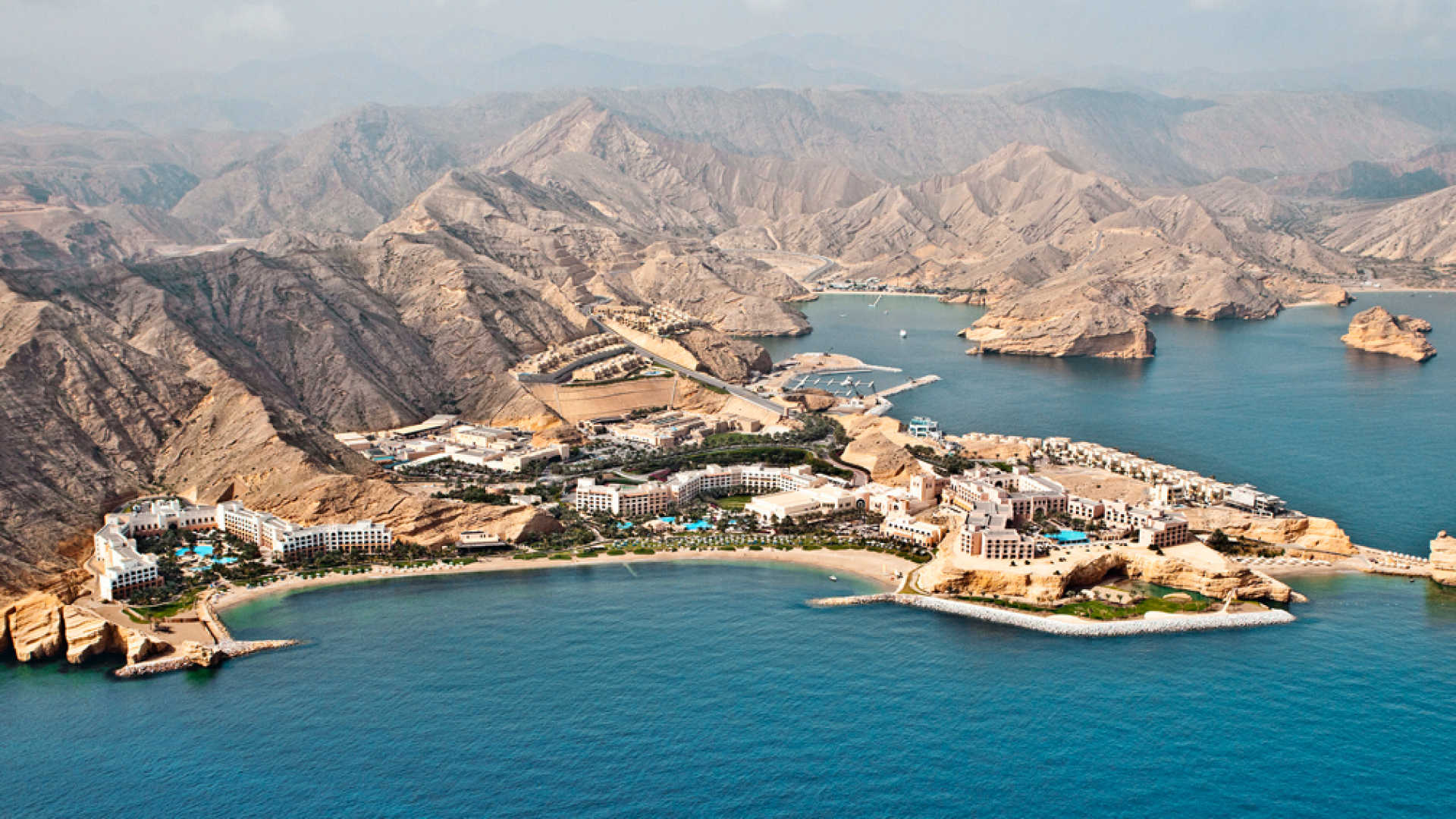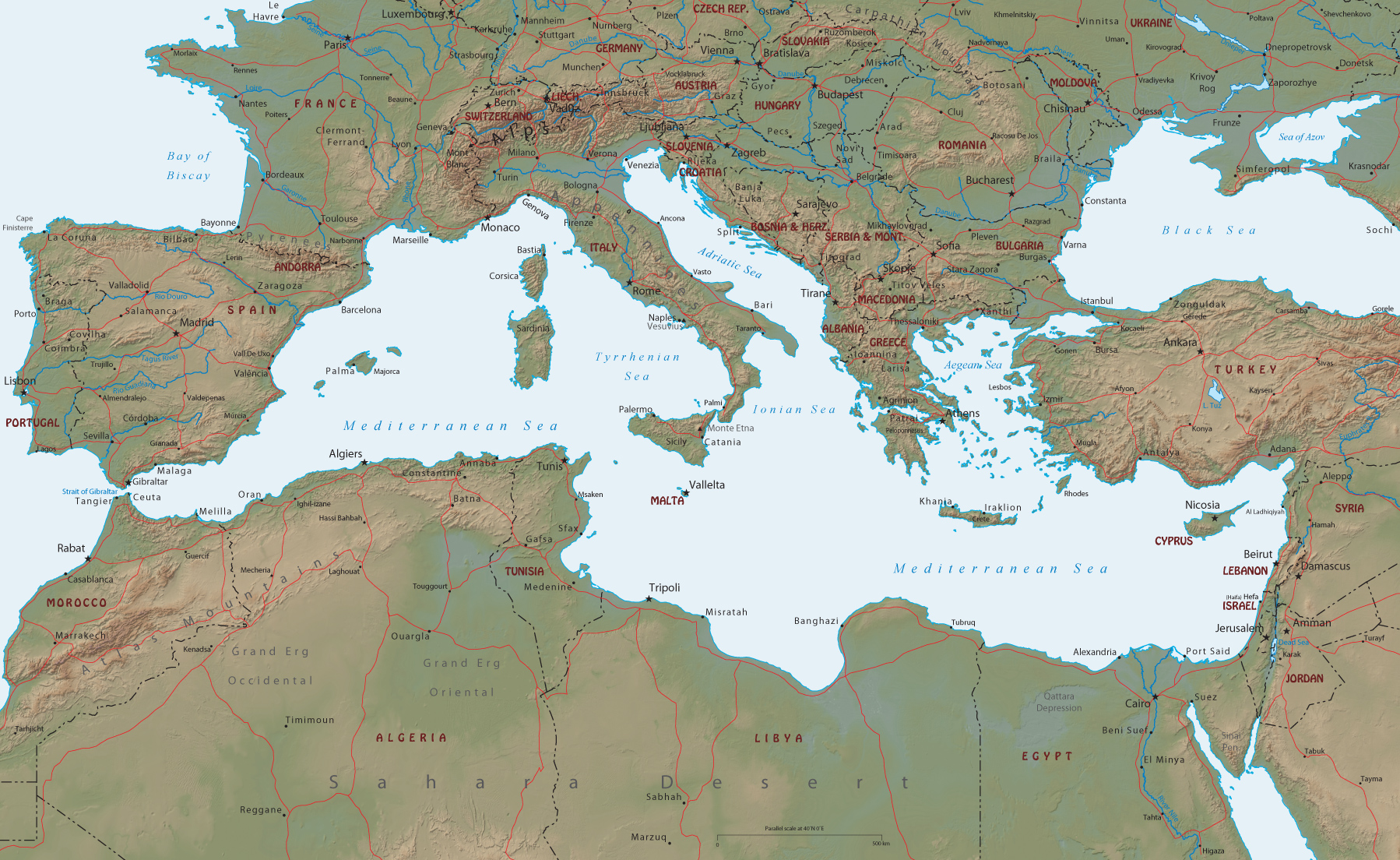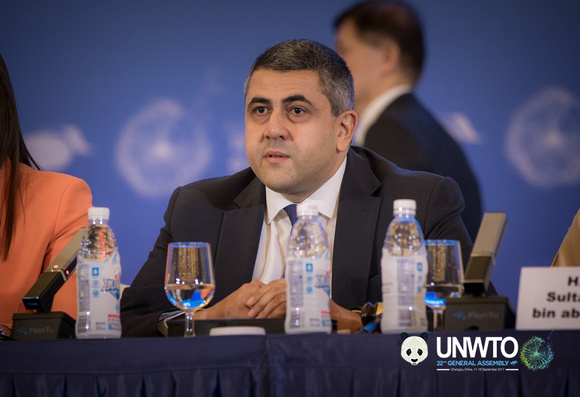

UNESCO and UNWTO Sign Muscat Declaration on Tourism and Culture: Fostering Sustainable Development
Culture, in all of its wondrous expressions, inspires more than 1.2 billion tourists to pack a bag and cross international borders each year. It is an important means to promote inter-cultural dialogue, create employment opportunities, curb rural migration, and nurture a sense of pride among host communities. Yet unmanaged, it can also harm the very heritage cultural tourism relies on.
Recognizing that a sustainable, approach with buy-in from all partners, is crucial to cultural tourism, peacebuilding and heritage protection, on 12 December, the Muscat Declaration on Tourism and Culture: Fostering Sustainable Development was signed by representatives of UNESCO, the World Tourism Organization (UNWTO), delegations, private sector, local communities and NGOs.
This concluded the two-day World Conference on Tourism and Culture co-organized by UNESCO and the UNWTO and hosted by the Sultanate of Oman. Through the Declaration, some 30 Ministers and Vice Ministers of Tourism and Culture, and 800 participants from 70 countries, reaffirmed their commitment to strengthen the synergies between tourism and culture, and to advance the contribution of cultural tourism to the 2030 Agenda on Sustainable Development.
“Cultural tourism is growing, in popularity, in importance and in diversity embracing innovation and change. Yet, with growth comes increased responsibility, responsibility to protect our cultural and natural assets, the very foundation of our societies and our civilizations” said UNWTO Secretary-General, Taleb Rifai.
Francesco Bandarin, UNESCO Assistant Director-General for Culture, emphasized that we need to create a positive dynamic between culture and tourism “that promotes sustainability while benefiting local communities. This dynamic must contribute to safe and sustainable cities, decent work, reduced inequalities, the environment, promoting gender equality and peaceful and inclusive societies.”
Ministers from Cambodia, Libya, Somalia, Iraq and Vietnam discussed the role of cultural tourism as a factor of peace and prosperity, and shared views on the capacity of tourism to support the recovery of their countries.
The Declaration calls for cultural tourism policies that not only empower local communities, but also employ new, innovative tourism models that advance sustainable development, host-guest interaction, and cultural exchange. It promotes integrating sustainable cultural tourism and the protection of heritage in national, regional and international security frameworks. The Declaration also references UNESCO’s 1972 Convention Concerning the Protection of the World Cultural and Natural Heritage and 2005 Convention for the Protection and Promotion of the Diversity of Cultural Expressions in relation to these objectives.
Ahmed Bin Nasser Al Mahrizi, Minister of Tourism of the Sultanate of Oman, highlighted the importance of exchanging experiences and ideas to achieving sustainable tourism development. Participants shared best practices on issues such as community engagement, visitors’ management, and use of resources from tourism in conservation in such diverse locations as the Ngorongoro Conservation Area in Tanzania, the Ras Al Khaimah in the United Arab Emirates or the Palace of Versailles in France. Entrepreneurship, SME’s and the protection of traditional knowledge were viewed as compatible with developing sustainable tourism, with examples from India in the hotel sector and in other regions developing local food initiatives. Other examples included World Bank projects revitalizing cultural heritage for sustainable tourism development, and Seabourn Cruise Line’s partnership with UNESCO to raise awareness of World Heritage with their guests.
Following the first UNWTO/UNESCO World Conference on Tourism and Culture in Cambodia in 2015, this second Conference was part of the official events of the 2017 International Year of Sustainable Tourism, so declared by the United Nations. Istanbul (Turkey) and Kyoto (Japan) will host the 2018 and 2019, editions respectively.

UNWTO: Southern and Mediterranean Europe, MENA drive tourism growth in October 2017
Destinations around the world welcomed 1.1 billion international tourists between January and October 2017, according to the latest UNWTO World Tourism Barometer. This represents a 7% increase on the same period of last year, or 70 million more international arrivals. Strong demand for international tourism across world regions reflects the global economic upswing.
The strong tourism demand of the earlier months of 2017, including the Northern Hemisphere summer peak season, was maintained through October. Destinations worldwide received a total of 1,127 million (+7%) international tourist arrivals (overnight visitors) in the first ten months of the year, 70 million more than in the same period of 2016. Results were driven by sustained growth in many destinations and a firm recovery in those that experienced declines last year.
In particular, destinations in Southern and Mediterranean Europe, North Africa and the Middle East showed extraordinary strength. Growth in international arrivals exceeded 7% in all destinations of Southern and Mediterranean Europe, with a rapid recovery seen in Turkey and double-digit increases for most of the region’s other destinations. In North Africa and the Middle East, Egypt, Tunisia and Palestine rebounded strongly from previous years’ declines, while Morocco, Bahrain, Jordan, Lebanon, Oman and the United Arab Emirate of Dubai all continued to report sustained growth.
“These robust results, the best we have seen in many years, reflect the sustained demand for travel around the world, in line with the improved global economy and the rebound of destinations that suffered declines in previous years,” said UNWTO Secretary-General Taleb Rifai at the 2nd UNWTO/UNESCO Conference on Tourism and Culture, held on 11-12 December in Oman.
“As we gather in Oman for this important event, we must acknowledge the strong resilience of tourism reflected in the continuous growth in many destinations of the Middle East, and the rapid recovery in others. Tourism brings benefits to local communities and visitors through the promotion of peace and mutual understanding and, as this event highlights, respect for cultural heritage and values.” Mr. Rifai added.
Regional Results
Europe (+8%) led growth in international arrivals in the first ten months of 2017, driven by remarkable results in Southern and Mediterranean Europe (+13%). Western Europe (+7%) rebounded from weaker results last year, while Northern Europe (+6%) enjoyed ongoing solid growth. Arrivals in Central and Eastern Europe grew 4% between January and October 2017.
Africa (+8%) was the second fastest-growing region over this period, thanks to a strong recovery in North Africa (+13%) and the sound results of Sub-Saharan Africa (+5%).
In Asia and the Pacific (+5%) results were led by South Asia (+10%), with South-East Asia (+8%) and Oceania (+7%) also enjoying a robust increase in arrivals. North East Asia (+3%) recorded more mixed results, with some destinations reporting double-digit increases, and others, declines.
South America (+7%) continues to lead growth in the Americas, where arrivals overall increased by 3%. Central America and the Caribbean both grew 4%, with the latter showing clear signs of recovery in October in the aftermath of hurricanes Irma and Maria. In North America (+2%), robust results in Mexico and Canada contrast with a decrease in the United States, the region’s largest destination.
Results in the Middle East (+5%) through October were mixed, with some destinations rebounding strongly and others continuing to report sustained growth, but the regional average was weighed down partly by a few that showed declines.
Strong recovery of outbound tourism demand from Brazil and Russia
As for outbound markets, 2017 is marked by a strong pickup of expenditure on international tourism in Brazil (+33%) and the Russian Federation (+27%) after some years of declines.
Most of the other source markets continued to grow at a sustained pace. Among the top 10 source markets, China (+19%), the Republic of Korea (+11%), the United States and Canada (both +9%), and Italy (+7%) reported the fastest growth in international tourism expenditure. Expenditure from Germany, the United Kingdom, Australia, Hong Kong (China) and France grew between 2% and 5%.

What happened and what is next for UNWTO? The untold story…
The World Tourism Organization on September 14, 2017, in Chengdu, China during the UNWTO General Assembly confirmed Zurab Pololikashvili, the candidate from Georgia, as the next Secretary-General of the United Nations World Tourism Organization (UNWTO). This confirmation was done by acclamation.
The General Assembly is the supreme body of UNWTO. Every 5th country is elected to be on the Executive Council to effectively make all recommendations for the General Assembly a simple process. It’s a rubber stamp process.
Unless there is an issue, and this last assembly had a massive issue, all of which required more than a rubber stamp approval of Madrid’s recommendation for who would be the new Secretary-General.
On September 12, the same Executive Council that voted for Zurab, the 106th session of the UNWTO Executive Council met for the last time in Chengdu, to present their recommendation, and to deal with the intervention by Zimbabwe about “irregularities” in the original election for Zurab Pololikashvili.
The Zimbabwe Minister of Tourism and Hospitality at that time, Dr. Walter Mzembi, was very clear and firm of his desire to have this issue discussed at the General Assembly. Put it all out on the table, let the Executive Council decide, was his forthright position.
Stay with this story, it gets strange. After the top level, closed-door discussions, Mzembi finally agreed to withdraw his objection at the General assembly, after he was assured there would be an election by secret ballot at the General Assembly, rather than a confirmation by acclamation if only one country asks for it.
The understanding was: No rubber stamp, it would be voted on.
This is important, ordinarily, the vote would be by acclamation. Mzembi was also assured there would be a committee to investigate the entire UNWTO process for future elections. It was strongly hinted to Mzembi he would be asked to spearhead this committee.
So, when The Gambia, during the General Assembly requested the secret ballot, this country was bullied to withdraw their request. Outgoing Secretary-General, Taleb Rifai made a large stink about requesting a secret ballot instead of acclamation, claiming in the assembly that this would destroy the unity of the organization.
He wanted the rubber stamp approval, despite the assurances made to Mzembi, this would not occur if anyone asked a secret ballot. So much for the top level closed door meetings assurances. Supporting Rifai were countries friendly with Georgia, and it appeared they were bullying the Gambia to withdraw their request for a secret ballot. Under immense pressure, Gambia did not want to appear to stand against the rest of the world and did eventually withdraw their request for the secret ballot.
In the meantime, a lobbyist convinced Minister Mzembi from Zimbabwe to accept acclamation. Subsequently, Mzembi walked up to the stage, and all three men, Mzembi, Rifai and Pololikashvili shook hands. Bring out the rubber stamp, the election was over.

Chapter two of this sorry story happened a day after the General Assembly when the new 107th session of the newly elected Executive Council met on September 16 in Chengdu. It was fully expected, as is the long-standing UNWTO tradition for any newly confirmed Secretary-General to present his deputy, and the rest of his executive team.
Curiously, this did not occur, because Pololikashivili wasn’t “ready”. Pololikashivili asked outgoing Secretary-General Taleb Rifai to push back the presentation and announce an extraordinary session of the Executive Council on the sidelines of the FITUR trade show in January 2018 in Madrid. Rifai announced this prominently at the 107th Executive Council meeting.
According to information provided to eTN, the employment contract for Carlos Vogeler, who also ran for the Secretary-General post, was not renewed as it was for other Executive Directors of the UNWTO. Zurab Pololikashivili told Vogeler his services would no longer be needed after Vogelers contract will expire December 31, 2017
It is not clear what will happen after outgoing Secretary-General, Taleb Rifai leaves his post. If the non-renewal of Vogelar’s contract is any indication, along with the lack of transparency, combined with backroom wheeling and dealing during the election, we as an industry should be very concerned, if not alarmed.
Based on reliable information received, and from reports of multiple clandestine meetings between Pololikashivili and the Chinese delegation before the Chengdu General Assembly, China has a good chance to be awarded the coveted UNWTO Deputy Secretary-General position.
If this occurs China will have even more global influence after the recent announcement of their own World Tourism Alliance during the UNWTO General Assembly in Chengdu.
Industry observers speculate with Pololikashivili having attended the recent wine conference in Argentina, this South American country will be featured in Pololikashivili’s still unknown executive team. The next WTTC Summit in 2018 will be in Buenos Aires.
The future of UNWTO is very unclear, and transparency within the UNWTO may well be a thing of the past. What is clear, Pololikashivli owes a great deal to Taleb Rifai. Without Rifai’s illogical backing and odd, unwavering support, the candidate from Georgia would not today be occupying world tourism’s top office.
Hopefully, Taleb Rifai will be doing the right thing for UNWTO, and call for this extraordinary Executive Council meeting in January and look at the structure as his last legacy act in the name of good international corporate governance and keeping to his word to the General Assembly.
This is the first time WorldTourismWire is releasing two recordings from the election proceedings at the UNWTO General Assembly in Chengdu. Do listen to these recordings from Chengdu. They are enlightening and released the first time on this news network.
FOLLOW UP:
